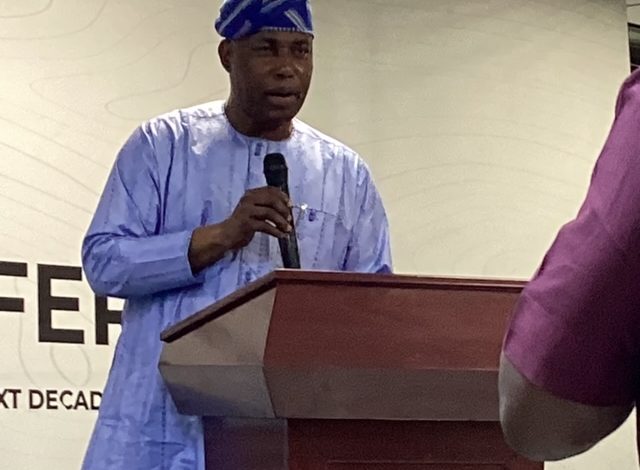Guardian Newspapers Boss, Martins Oloja, Highlights Priority Areas for Incoming Administration

Managing Director and Editor-in-Chief, Guardian Newspapers, Martins Oloja, Speaking at the event
The Managing Director and Editor-in-Chief, Guardian Newspapers, Martins Oloja, has charged the Bola Ahmed Tinubu-led administration to adopt the private sector approach to put the nation on a steady path to achieve economic growth and development, urging them to prioritise the welfare of electorates.
He enjoined the incoming administration to also prioritise efforts in nation building more than ever before, explaining that the nation has been divided as a result of ethnic bias and other socioeconomic and cultural factors.
Speaking at the inauguration of new Executive of the Commerce and Industry Correspondents Association of Nigeria (CICAN) tagged the “Agenda Setting for the Incoming Federal Government Administration” in Lagos, he stated the need to encourage the incoming administration to manage priorities in the public sector as if it were in the private sector.
“Let me quickly clarify this: it is important to adopt the private sector approach and see citizens as customers to be satisfied. Marketers are always told in a customer-centric business that the customer is king. In this construct, the citizen should be seen by political leaders as a customer whose rebellion or boycott can destroy a business enterprise. When political leaders begin to see the citizen as a customer whose patronage is necessary to survive, they will begin to treat the people as potential electorate they will depend on to win elections next time,” he said.
“Prioritisation can be a device for policy-makers to realise political ambitions, or to signal policy shifts. However, prioritisation is also typically embedded in policy processes, either in a routinised fashion, or as responses to triggering events. Key challenges in this regard can be how to translate broad priorities into programs and projects, how to govern the knowledge base, and how to handle organisational tensions during implementation. Many of these challenges must be addressed by ‘street-level’ administrators and agency experts during implementation,” he advised.
He, however, stated that the removal of the petrol subsidy, the crashing or hike in the petrol price presently at over N190 per litre, as well as making petroleum products available are the immediate hurdles the incoming Tinubu administration must resolve after May 29.
“Our new leaders should develop their own tactics to put across the sense of urgency and prove that they are materially attentive to the needs of their citizens,” he advocated.
Also speaking, the MAN president, Otunba Meshioye Francis, advised the incoming President to as a matter of urgency reverse with immediate effect the 2023 fiscal policy measure that raises taxes on beverages and tobacco while also address the issue of multiple taxes in the country.
Represented by the Head Communications, MAN, Ambrose Oruche, stated the need to give the productive sector maximum priority for the general good of all in terms of wealth and job creation for the nation.
He also called on the need to promote the use of local content by mandating the patronage of Made-in-Nigeria products by all government parastatals, agencies, and ministries; revisit executive orders 003 and 004; create a special window for forex allocation to the manufacturing sector; identify and break the powerbroker militating against the completion of the Ajaokuta steel complex to make available raw materials for our steel and automobile industries and provide incentives to encourage a rapid energy transition in the manufacturing industry.
Speaking further, he urged the incoming administration to give tariff preferential treatment to the motor vehicle and assembly sector pending the development of the iron and steel sector; revisit and reactivate dormant export incentives and engage and dialogue with the key stakeholders in the manufacturing sector on overcoming the challenges troubling the sector.
“The incoming administration must pay particular attention to this critical low-hanging fruit agenda with a deep sense of effective implementation and monitoring. This requires an unwavering and high spirit of commitment, dedication, and selflessness in public service delivery by the new administration,” he said.
He added that the magnitude of the responsibility awaiting the new administration is enormous, demanding high senses of determination, and resourcefulness, as almost all parts of the sectors are presently in shambles, squarely squabbling in crisis
“The crisis ranges from political and social rascality to arrays of economic imbalances. Economic imbalances in terms of multiple taxes, fees, and levies imposed by all tiers of government, forex scarcity, a bourgeoning borrowing interest rate, energy insecurity, and an infrastructural deficit in a highly inflationary environment. This is due to misaligned macroeconomic policy, policy misconceptions, negligence, and mismanagement, which have unimaginably negative impacts on the real sector,” he noted.
According to him, the impact is graver among industries, especially manufacturing, which has been battling poor performance and is now on the verge of collapsing as a result of these challenges, especially taxes.
In his words; “Emphatically, while the government believes in tax increments to rake in more revenue, the action is highly counterproductive because a high tax burden on manufacturing and small and medium-scale businesses will squeeze their profit margins, which will have an adverse effect on their tax-paying ability. As a matter of fact, multiple taxes on the manufacturing sector cannot enhance government revenue; rather, it will only erode the operational capability, effectiveness, and competitiveness of the industry, with huge negative spillover effects on government earnings, job creation, and the economy at large.”
The National president, Nigerian Association of Chambers of Commerce, Industry, Mines and Agriculture (NACCIMA), Ide John Udeagbala, said the Nigerian economy is primarily powered by the Small and Medium Enterprises, (SMEs) as over 85 per cent of the country’s industrial sector is reliant on the SMEs which embodies the informal sector also.
“As the “Voice of Nigerian Business”, a leading member of the Organized Private Sector (OPS), and the umbrella body for all City, State, and Bilateral Chambers of Commerce in Nigeria, including Business Associations, NACCIMA encourages the incoming Federal Government Administration of CICAN to pay attention to these issues, amongst others, and cooperate with all public and private sector partners to enunciate policies that will foster a private sector-driven economy in Nigeria,” he averred.
“While we believe that this new administration will do great exploits, exceeding the works of their successors, I would also like to use this opportunity to charge you all to work closely with NACCIMA, as the synergy will be needed to further promote business interests in Nigeria and the global economy at large,” he urged.
On her part, the immediate past president, Lagos Chamber of Commerce and Industry (LCCI), Mrs. Toki Mabogunje, explained that the rising debt profile of the country is worrisome, pointing out that the country is still being faced with forex liquidity concerns, contracting disposable incomes, rising inflation, escalating unemployment, business disruptions and investment uncertainties.
She emphasised the need for policymakers to expeditiously develop a framework that will ensure the country has a well-diversified revenue base, stressing that this imperative for macroeconomic stability.
“There is a need to deepen efforts to improve investment in human capital development, particularly education and health. There is a strong imperative for mass employment of our teeming population, which in turn will have a positive effect on the current insecurity problems facing the country. The imperative of self-reliance with respect to food security and energy security,” she advised.
She, however, said the Media is critical for public policy advocacy to be truly effective, saying that the importance of the role of the media in the process of disseminating policy-related information through the communications media, especially where the aim is to effect action, a change of policy or to alter the public’s view of issues cannot be over emphasised.
“This is where the CICAN has such an important role to play in Nigeria’s democratic dispensation. CICAN was established in 1990, to enable the practice of Business Journalism, and it has maintained momentum and growth ever since, with its relationships with journalists throughout the country. The practice of economic journalism engages the analytical skills of the business journalist to report well on crucial economic issues, and provide citizens with an understanding of core social and economic realities (and values) that are needed to keep a democracy in place,” she stated.
The Former Ag Director General and Chief Executive Officer, FIIRO,Dr. Chima C. Igwe, said commerce and industry are the two sides of a coin and are known as the key drivers of any economy while the media (CICAN) are strategic players in actualizing both.
He noted that in the past few years, Nigeria and Nigerians experienced a sudden and significant drop in economic activities which led to the loss of the purchasing power of the currency, the Naira, but although, has been able to exit the recession, warning that the strangling effects might still be seen lingering with the possibility of a relapse if the nation does not diversify.
“For national growth and development, national security and economic recovery and diversification, research and development in the fields of science, engineering, technology and innovation must be at the forefront because it is the very foundation of any successful industrial revolution and industrialization. It is practically impossible to envision a life today without a reliance on science technology and innovation in our everyday life,” he advocated.
He maintained that Science, technology and innovation (STI) is a very crucial cross-cutting sector in all developmental efforts of any nation if it is to be sustainable.
He commended CICAN for organizing the event, saying that subsequent general meetings of CICAN will enable the association to push for, monitor and interrogate the agenda for the incoming Federal Government Administration.
Earlier, the president, CICAN, Mr. Charles Okonji, called on the government at all levels to retool, revamp and rejig the nation’s ailing economy while also calling the President-elect to focus on working the talk and delivering on the promises of his administration.





